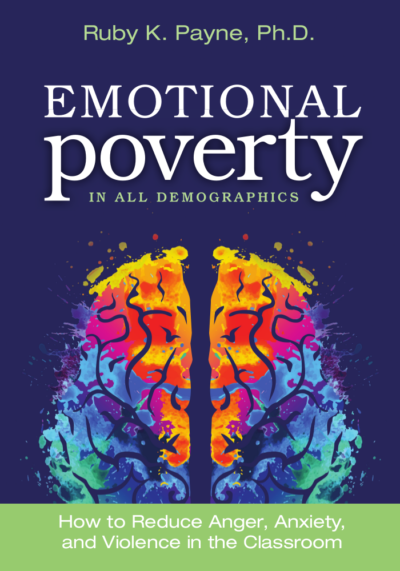 “If only they were motivated, if only they were not so angry, if only I felt safer.”
“If only they were motivated, if only they were not so angry, if only I felt safer.”
School safety is now a primary concern for educators, who are increasingly frustrated by confrontations over students’ disruptive and unproductive behaviors. But information about the emotional sources of this behavior is lacking, as are tools for managing behavior.
Consequences will always be needed.
But we can change the approach.
In her book Emotional Poverty, Payne turns to brain and developmental science to help change the conversation. To do that, she shares her understanding of what motivates good behavior and of the underlying emotional causes of unsafe and disruptive behavior.
Educators will learn to:
- Create safer classrooms by reducing “less than” and “separate from” experiences for students
- Teach students about a regulated, integrated brain and how to calm themselves
- Help build strong inner selves in students through validation
- Identify and address insecure, emotionally unbonded students
- Be aware of our own emotional realities as we promote the safety and well-being of students
Now schools can prepare students to address emotional issues just as they do for academic issues. Working to increase emotional resources in students is the first and biggest step toward motivating healthy behaviors.
“Emotional Poverty provides a road map to guide us around that wall by providing clear conceptual frameworks, lightning-like insights, immediate concrete tactics, illustrative examples and stories, and effective strategies.”
–Jack Moye, Ed.D., President, Front Line Consulting, Richmond, VA
“[The impact of current events] reverberates in today’s classrooms in ways that have shattered the sense of safety for students and adults. This thoughtful book provides critical strategies just when we need them the most.”
–Rebecca Katz, Ed.D., School Associate Superintendent, Clark County SD, Las Vegas, NV
“Most active shooters in schools, if not the majority of active shooters in public spaces, have striking similarities across the board. Many of these similarities are discussed in this book.”
–Gary Rudick, Former Chief of Tulsa Public Schools Campus Police, Current Member of the Oklahoma Commission on School Security
Developing a culture of caring and support isn’t expensive.
Every school district has the resources to address emotional poverty.
Author Ruby K. Payne, Ph.D. is a career educator, administrator, consultant, and founder of aha! Process. Her trailblazing efforts to address the needs of under-resourced learners include dozens of publications and training programs that have served hundreds of thousands of educators at all levels.








